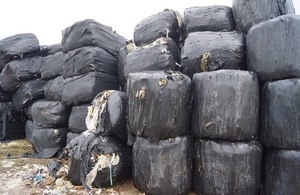
It a well known fact that industrial units have always been targeted by waste criminals, leaving premises full of waste, often structurally damaged and with a costly clean-up bill.
Now investigations by the Environment Agency have revealed that ‘baled waste crime’ is on the increase. The waste is often plastic, builders, commercial or household rubbish that cannot be recycled and which has no monetary value.
Click here to read the full press release from the EA on this subject.
What are the risks of waste and how can you prevent yourself from becoming a waste crime victim?
There are several risks to property owners if waste ends up being illegally dumped on your land or premises.
- Financial: waste illegally dumped will have to be removed to a permitted waste site. This inevitably falls to the property owner and the costs can be high.
- Reputational: illegal waste dumping can result in considerable local and national media attention. These sorts of activities can damage reputations.
- Enforcement: anyone involved in the illegal keeping, treatment and disposal of controlled waste commits an offence, in some cases even if it is done unwittingly. The Environment Agency can serve notice on property owners to clean up any waste left on their land if not correctly permitted.
Steps to take to protect yourself
Ensure you understand what your tenants business is:
- Ask if your tenant is involved in waste activities on your land
- Check if they have the necessary authorisations in place to carry out the activity, including planning permissions
- Use the Public Register to check your tenant has a current permit or carrier/broker registration: www.gov.uk/guidance/access-the-public-register-for-environmental-information
- Make sure you understand the difference between a site that is permitted by the Environment Agency and one that is register exempt.
- Familiarise yourself with the relevant legislation and the risks posed to you if a site doesn’t meet the conditions of their permit or the terms of their exemption. An operator who registers an exemption yet fails to comply with the conditions set out in that exemption is carrying out an illegal activity.
Carry out rigorous checks on prospective new tenants:
- Make sure you secure adequate identification documents and a down payment from a traceable bank account.
- Use freely available information such as Companies House Beta. https://beta.companieshouse.gov.uk/
- If you are renting to a newly formed company, make sure you meet and initially deal with the Company Director.
- Investigate the status of the new company’s finances to ensure they are strong.
- Check if the new company has a website and look to see if contact details match those you have been given.
- Ensure you know what business they intend to carry out in your unit and that is appropriate for the unit size. Check their business model make sense. Ask for examples or references for work done elsewhere.
- Be cautious if your prospective new tenants arrive on foot and not in a vehicle.
- Make sure you check out the details of any witness to the lease agreements, to be sure they are plausible and traceable.
Check that tenants are operating properly by carrying out periodic inspections and audits. Any of the following could indicate they are not operating the business they said:
- More lorry movements that you would expect for their business
- Activities on site at strange hours of the day and night
- Evidence of unusual odours and/or pests
- Complaints from adjacent tenants about their new neighbours.
Share information on poor practice and suspected wrong-doing:
- The Environment Agency are looking for you to share information with a view to building effective partnerships, work together more efficiently and make earlier, more targeted interventions.
- You can contact the Environment Agency incident hotline 24/7 on 0800 807060.
- Or send information anonymously to Crimestoppers on 0800 555 111 or online at www.crimestoppers-uk.org.
- The reports they receive through Crimestoppers help them to identify companies that are illegally operating or exporting waste illegally.
What if it happens to you?
Many property owners policies contain an element of cover for Fly Tipping to pay for the costs in clearing and removing any property illegally deposited so if you do have an occurrence please contact us so we can notify your insurer.



